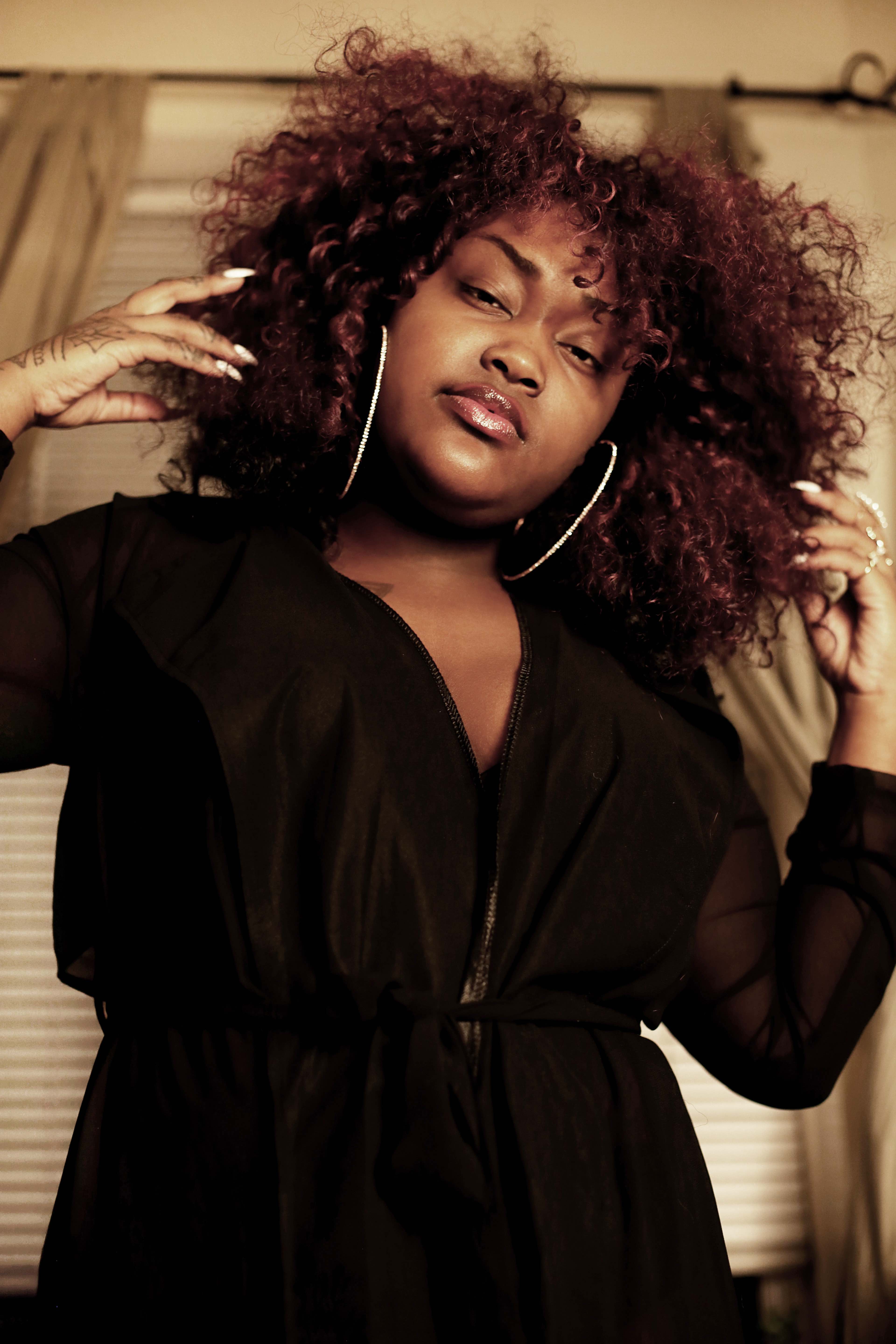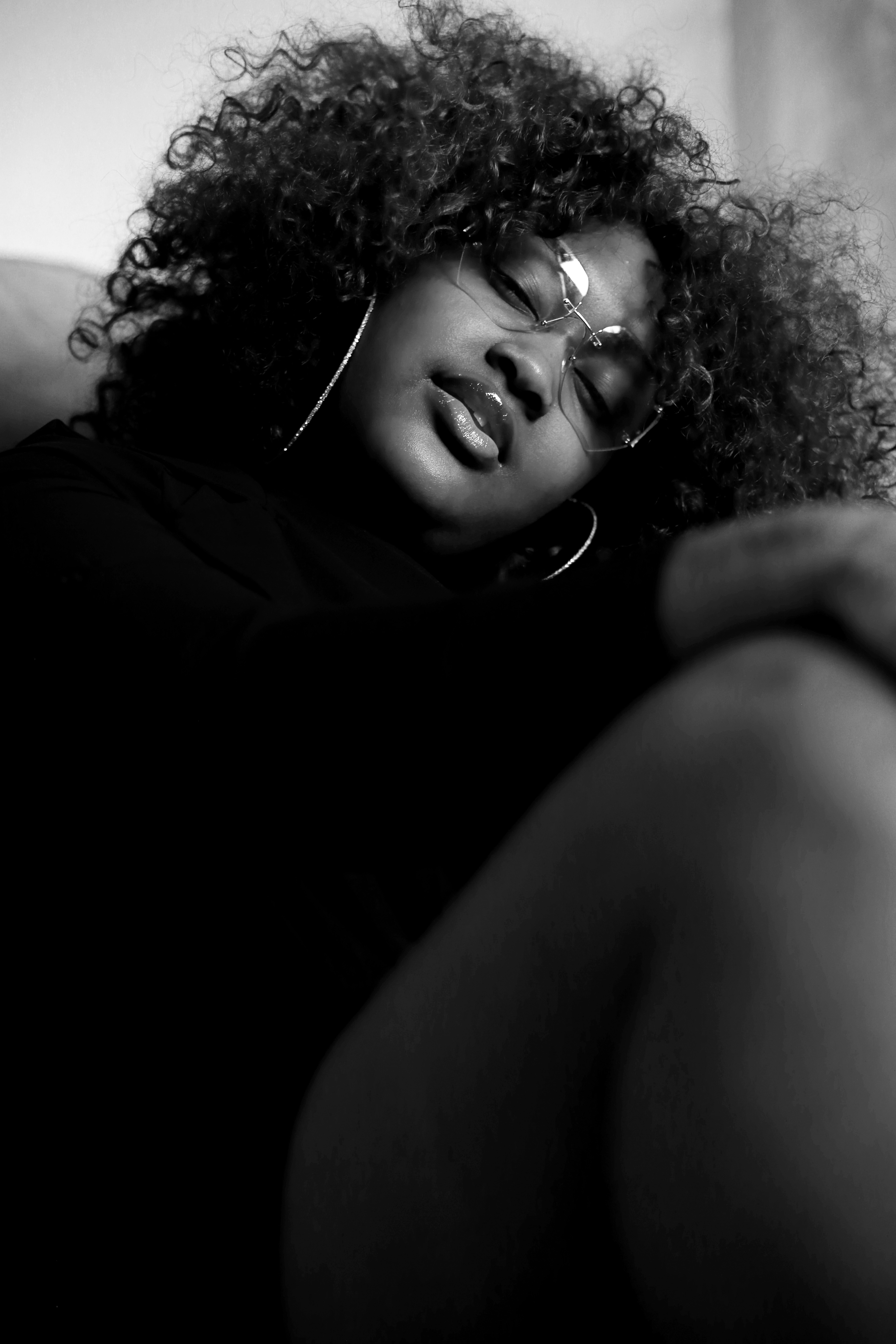
The Chicago rapper’s breakout hit was called “Vagina,” but she’s secretly an introvert.
If you’ve seen the viral video for CupcakKe’s track “Vagina,” then you probably wouldn’t believe that she’s painfully shy. Since the clip has racked up over two million views on YouTube, the Chicago native has solidified her place as rap’s newest feminist voice. But behind her unapologetic stage presence (which is sometimes even more outrageous online), CupcakKe is still just Elizabeth Harris, a 20-year-old who struggles with depression and doesn’t like to talk much IRL. “At home, you can hardly get a word out of me,” she admits. “In a lot of ways, CupcakKe is my shield.”
Having grown up around Chicago, the rapper spent time living in homeless shelters before getting turned on to rap at 13 by someone in her church. “Back then, everything I wrote was about God,” she explains. “Then one day, this guy said, ‘Yo! Why don’t you flip that shit into some rapping? You’ll make more money and people will know your name.’ So I walked out, and that was it.”
Since then, she’s self-released two mixtapes and two records, and is gearing up to drop a third early next year. Though it does take a more political approach than some of her previous work, the album maintains the same blend of sex and sarcasm for which the rapper’s become known. And while she might have doubts when it comes to being Elizabeth, as CupcakKe, she’s totally self-assured — or, as she puts it in lead single, “Cartoons,” “Bitch, I’m cocky like Johnny Bravo.” Here, the artist talks about her new record and how CupcakKe has changed her mental health.

You’re about to release a new record. How does the album reflect your evolution as an artist?
“Cartoons” says a lot about where I’m at and where I’m headed. I mean, I’ve always been proud of my lyrics and really good at playing with words. But I also felt like, ‘Damn, if only I could get my flow in check.’ This record is just 10 out of 10 in that department. It really shows how I’ve perfected my craft. Right now, I’m at a point where—and not to be cocky—but no one can tell me shit about my work.
Some of your most popular tracks have been about sex, but the new record seems to take a different direction—at least, with “ Exit ” and “Cartoons.” Was that a conscious decision?
With this album, I wanted something different—I wanted to shake people up. As soon as I said I was going to be dropping my new single, everyone was commenting saying, ‘It’s going to be about having sex or giving head or something.’ So I really shifted when I released “Exit” and then “Cartoons.” But I’ll never stop making freaky music. Sex is part of who I am, it’s my brand.
Why do you think that’s been so appealing for people?
Because it’s blunt truth. This is how I look at things: We have a million songs about love and money, and going to work, feeling all lovey-dovey. But what about the other stuff? Like getting fucked, or police brutality. Let’s not leave that stuff out—it’s just as important to talk about.
You mention police brutality, which is something you addressed in “ Picking Cotton.” What’s been the driving force behind your choice to write more political lyrics?
It’s just about the fact that these things need to be talked about. A lot of artists don’t want to say anything about what’s going on, because they’re scared they’ll lose fans or something. But the more awareness there is, the more justice. So I figure it’s my place to stand up. Things like police brutality shouldn’t be put on the back burner because it’s not fun to sing about. Not every cop is corrupt, but we can’t just keep our mouths shut.
The internet has been a big part of your career ever since “Vagina” went viral. Why has it been so important to you to be so active on social media?
I don’t want my fans to feel like they’re just fans—I want them to feel like they’re family. Most artists just release a single and say, ‘Here’s my new song, go purchase it!’ Then they’ll get on Twitter again to post the next link. It’s just like damn, you’re getting their money, but you can’t even talk to them or reply to a tweet? I’m not too cool for that—I still write the way I did when I was in homeless shelters, and I’ll always try to remain humble because I never forget where I came from. I could have a million dollars in my pocket, but I’m still going to get on Twitter and talk about my sex life.
Is your online persona just an extension of CupcakKe?
I’m really three people: At home, I’m Elizabeth, onstage I’m CupcakKe, and when I’m on Twitter, I’m Marilyn Monhoe. Elizabeth is shy and quiet, a keeps-to-herself kind of person. CupcakKe is a character—she’s sexual and outgoing, all that and more. Then you have Marilyn Monhoe—she’s my alter ego’s alter ego. When I’m online, I can say whatever the fuck I want.
A lot of people use social media to project a certain image of themselves. Marilyn Monhoe might be an exaggerated character, but it seems like you’ve always been pretty honest about who you are offline.
I’ve never tried to make it seem as if my life is perfect, because it ain’t. I deal with depression all the time. Elizabeth has no friends, she constantly stays at home. Then CupcakKe gets onstage and does her thing. But the second it’s done, she doesn’t want to do it anymore. I know it sounds strange, and it’s just as weird to talk about, but I have a really hard time balancing who I am at home with who I am onstage or online. An artist from Chicago named Tink always says, ‘It’s lonely at the top,’ and it really is. But that’s when I like to turn into Marilyn Monhoe, sign online, and bring laughter to others. When they think I’m doing that for them, I’m really bringing happiness to myself by putting that stuff out there. Being CupcakKe is my way of escaping the sadness Elizabeth goes through.
Has being CupcakKe helped you?
Definitely. In many ways, being her has let me get out the stress of being Elizabeth.
Is that why you write and release so much music?
You should never get comfortable. There are so many artists out there saying they can do what I do, just how I do it. And even if they can’t, there is always someone waiting to take your spot. When you get it, you have to keep it—you can’t get it and decided to take some time off. Music is what I love, but it’s also my job. If I worked at a store and only showed up for two days, I’d get fired. Rapping, for me, is the same thing. That’s why I like to put out new music every two or three weeks—I’m at work, showing up on time.
This article was originally published by i-D US.
